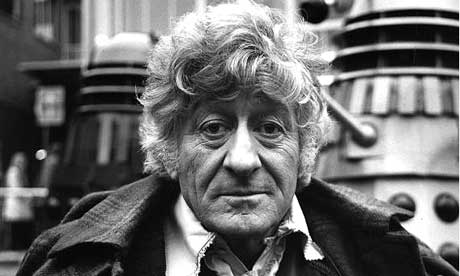

Most of the character groups in this study did not interact enough to show noticeable trends in address and reference terms. I will therefore focus on a few interesting trends in interactions between the main characters.
First is that the UNIT chain of command is immediately apparent in the data: speakers of lower status overwhelmingly call their superiors "sir", while speakers of higher status have more options for addressing their subordinates. So Benton, Yates, and Jo all address the Brigadier as "sir," but Benton also addresses Yates as "sir," proving that Yates (a captain) outranks Benton (a sergeant). Meanwhile, Jo and Yates address each other by nicknames ("Jo" and "Mike"), and both address Benton with title and surname ("Sergeant Benton") or just surname ("Benton"). The former is generally more formal than the latter. This suggests that Jo and Benton are considered to be of the same rank relative to Benton on the one hand and the Brigadier on the other.
Meanwhile, the ways in which the Brigadier addresses his subordinates reveals an interesting fact about gender in the UNIT hierarchy. The Brigadier is free to call Yates and Benton by either surname or title and surname, but he almost always addresses Jo as "Miss Grant" (title and surname), and never simply as "Grant"! Societal restrictions on interactions between men and women require the Brigadier to use more formal language when addressing his female employees. This can also be seen in his interactions with Corporal Bell, a female officer who appears in only two serials ("The Mind of Evil" and "The Claws of Axos") and who I have lumped in with the "soldier" category because of her limited number of appearances. Of the five times the Brigadier addresses her in those two serials, three are by title and surname and none by surname alone. There may be other situational constraints--perhaps Corporal Bell only appears in scenes containing more formal discourse situations--but it is still likely that gender plays a role in the Brigadier's choice of words.
Interactions between the Doctor and the Master show that their relationship, whether romantic or not, is very one-sided. Though they have about the same number of possible levels at which to address each other (fewer than in interactions between humans, because both the Doctor and the Master use their titles in place of names), the Master uses more of his options than the Doctor does. The Doctor addresses the Master as "you" almost exclusively, while the Master also addresses the Doctor by title "Doctor" and occasionally with endearments "My dear Doctor." This different use of address terms indicates that the Doctor and the Master perceive the conversational frame they interact in very differently: the Doctor doesn't seem to want anything to do with the Master, while the Master seems to be constantly trying to get the Doctor's attention.
It can reasonably be expected that characters would use endearments (like "my dear" or "my dear [name]") as markers of intimacy. The data suggests the opposite: as time passes, and the main characters presumably get to know each other better, they use fewer endearments to address each other. In addition, the characters who use endearments (mostly the Doctor and the Master, plus a couple of category characters) usually see themselves in a position of power over their addressees: the Doctor knows something the Brigadier doesn't, or is comforting Jo in a stressful situation; the Master has used some cunning scheme to trap the Doctor; not to mention Mailer, the leader of a prison riot in "The Mind of Evil" (in the "other" category), who addresses Jo as "darling" and "clever girl." It comes off as patronizing, and in Mailer's case, creepy. The fact that endearments seem to be used only to mark status, and not to mark solidarity, may be an argument against the shippability of characters in this era of Doctor Who.
This project is far from over. So far, I have only considered episodes from two seasons of Doctor Who; the next step will be to expand my data set to the five seasons that comprise the UNIT era, to track interactions between the main characters over the longest possible period of time. Other potential projects involving this data, and other data from the show, include:
![Creative Commons BY-NC-SA 3.0 Unported License [Creative Commons BY-NC-SA 3.0 Unported License]](https://obdurodon.org/images/cc/88x31.png)